Amy Ritterbusch
Dr. Amy E. Ritterbusch is an Associate Professor of Social Welfare at the UCLA Luskin School of Public Affairs. Her work illuminates both the theory and practice of participatory action research (PAR), invoking the Latin American origins of this mode of inquiry, and focuses on multiple forms of state violence perpetrated against what she and activist co-authors refer to as ‘street-connected’ communities, including children and youth who depend on the streets for survival in the absence of other caring structures. Dr. Ritterbusch leads PAR collectives in Colombia and Uganda that work in solidarity with street-connected-communities against police violence and forced displacement.
The urgency of action, from the streets toward policy, is a key focus of Dr. Ritterbusch’s scholarship, and her work offers methodological and theoretical insights on how to do PAR with historically marginalized communities in ways that repel extractive, unilateral, and colonial modes of traditional scientific inquiry. Throughout her research and teaching career, she has explored different forms of radical accompaniment of social leaders on the frontlines in the global South and continues to imagine new pathways forward toward a Fals Bordian ciencia popular involving the collective work of movements and academics in protective spaces that grow in distance from both the non-profit and academic industrial complex.
Dr. Ritterbusch’s scholarship involves public intellectual work in the global South including human rights shadow reports, street-level organizing and collective writing that seeks to influence policy outcomes for social justice. Her research has been funded by the Open Society Foundations, the National Science Foundation, the Fulbright U.S. Program and other networks promoting global social justice.
Selected Collective and Individual Publications:
Correa-Salazar, C., Martínez, L., Maldonado Salamanca, D., Ruiz, Y., Rocío Guarín, L., Hernández Guarín, A., & Ritterbusch, A. (2022) Reflections on activism, the academy and the Non-Profit Industrial Complex in Colombia: What a revolutionary ethos might look like, Global Public Health
DOI: https://doi.org/10.1080/17441692.2022.2042354
Ritterbusch, A., Simbaqueba Gomez, A.L., Restrepo, J., Montes, N., Rentería, C., Velazco, Y., García Jaramillo, S. & Maldonado, D. (2021). Growing Up Guerreándola: On Adolescent Formations of Conscientização in Colombia. The Journal of Sociology and Social Welfare 48(4): 118-146.
DOI: https://scholarworks.wmich.edu/jssw/vol48/iss4/7
Ritterbusch, A., Pinzon, E., Reyes, R., Pardo, J., Jaime, D., Correa-Salazar, C. (2020). ‘I feel safer in the streets than at home’: Rethinking harm reduction for women in the urban margins. Global Public Health. 15(10): 1479-1495.
DOI: https://doi.org/10.1080/17441692.2020.1751234
Ritterbusch, A. & El Cilencio. (2020). ‘We will always be street’: Remembering the L in Bogotá, Colombia. City. 24(1-2): 210-219.
DOI: https://doi.org/10.1080/13604813.2020.1739915
Ritterbusch, A., Boothby, N., Mugumya, F., Wanican, J., Bangirana, C., Nyende, N., Ampumuza, D., Apota, J. & Meyer, S. (2020). Pushing the Limits of Child Participation in Research and Policy-Making: Reflections from a Youth-Driven Participatory Action Research (YPAR) Initiative in Uganda. International Journal of Qualitative Methods. 19:1-12.
DOI: https://doi.org/10.1177/1609406920958962
Ritterbusch, A. (2019). Empathy at Knifepoint: The Dangers of Research and Lite Pedagogies for Social Justice Movements. Antipode 51(4): 1296-1317.
DOI: https://doi.org/10.1111/anti.12530
Human Rights Reports
Comisión Ciudadana Nacional e Internacional (National and International Citizen Commission). (2022). “En Colombia Nos Volvimos Cifras”: Informe para el esclarecimiento de los hechos occuridos el 9, 10 y 11 de septiembre de 2020 en Bogotá y Soacha [In Colombia We Became Numbers’: Shadow Report for the Historical Clarification of the [Police Brutalities] Occurring on the 9th, 10th and 11th of September of 2020 in Bogotá and Soacha]. Bogotá: CCEEU (La Coordinación Colombia Europa Estados Unidos) Available online:
https://www.cinep.org.co/es/informe-en-colombia-nos-volvimos-cifras/
https://coeuropa.org.co/en-colombia-nos-volvimos-cifras/
Simbaqueba, A., Restrepo, J. & Ritterbusch, A. (2020). Vidas y territorios en disputa: dolor, memoria y lucha de la población LGBTI en las laderas [Lives and territories in dispute: Pain, memory and struggle of the LGBTQ community in the urban margins]. National Truth Commission. Bogotá, Colombia.
Available online: https://issuu.com/vidas_territorios_en_disputa/docs/vidas_y_territorios_en_disputa_–_dolor__memoria_y
Blandón, T., Espinosa, J., González, T., Camacho Iannini, S.I., Juanita, Llano Agudelo, A., Fonseca, C., González Coy, P., Guardiola Navarro, A.C., Leguízamo Parales, M.V., Maldonado Salamanca, D., Pérez, C., Pérez, G., Romero, A., Ruiz, Y., Salamanca Cortés, J., Sarasty, A.S., Uribe Durán, S., Victoria Mena, P., Weinstein, L., Summer, V., Ritterbusch, A. & González, M. (2019). Sueños furiosos: Aportes para la construcción de una agenda política trans [Furious Dreams: Contributions for the Construction of a Trans Political Agenda]. Institute on Inequality and Democracy. Luskin School of Public Affairs, UCLA.
Available online:
Tovar, M., Trejos, C., Giraldo, Y., Delgado, G., Lanz, A., Lanz, S., León, S., Lloreda, A., Pardo, L., Morales, A., Salamanca, J & Ritterbusch, A. (2017). Destapando la olla: Informe sombra sobre la intervención en el Bronx [Uncovering the Pot: Shadow Report on the [Police] Intervention in El Bronx]. Bogotá: Impresol Ediciones.
Available online:
https://issuu.com/cpat_ong/docs/destapando_la_olla_
Cubides Kovacsics, M.I., Lloreda, A., Pardo, L., Picasso, N., Lanz, A., Ritterbusch, A., Montoya, M.J., Guzmán, Y., Cocomá, A., Rubianogroot, M., Vargas, M.A., Chaux, S. (2016). Ley Entre Comillas: Informe de Derechos Humanos del Observatorio de Trabajo Sexual [. Bogotá: Parces – PAIIS.
Available online:
https://issuu.com/adrianamarialloreda/docs/ley_entre_comillas_informe_ddhh_tra

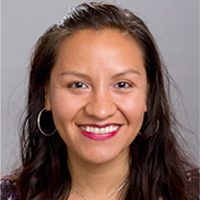 Amada Armenta: She is returning to UCLA where she completed her PhD in sociology, and will join Urban Planning in the fall. Armenta comes to UCLA from the University of Pennsylvania where she is an Assistant Professor of Sociology. Her work looks at immigration enforcement and its impact on the lives and communities affected. She is particularly interested in the intervention of the criminal justice system in immigration enforcement. She has been published in Social Problems and the Annual Review of Sociology, in addition to her University of California Press book, “Protect, Serve, and Deport: The Rise of Policing as Immigration Enforcement.”
Amada Armenta: She is returning to UCLA where she completed her PhD in sociology, and will join Urban Planning in the fall. Armenta comes to UCLA from the University of Pennsylvania where she is an Assistant Professor of Sociology. Her work looks at immigration enforcement and its impact on the lives and communities affected. She is particularly interested in the intervention of the criminal justice system in immigration enforcement. She has been published in Social Problems and the Annual Review of Sociology, in addition to her University of California Press book, “Protect, Serve, and Deport: The Rise of Policing as Immigration Enforcement.”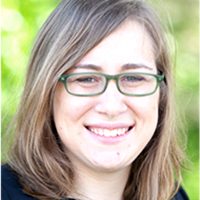 Natalie Bau: She is an international economist currently at the University of Toronto and will be joining Public Policy. Bau’s work examines several different aspects of the economics of education and educational policies and their downstream implications, including the effects on marriage patterns, teacher pay, student achievement and motivation, and others. She has projects in the works including “The Misallocation of Pay and Productivity in the Public Sector: Evidence from the Labor Market for Teachers” as well as “Labour Coercion and Economic Growth: Evidence from the Harrying of the North.”
Natalie Bau: She is an international economist currently at the University of Toronto and will be joining Public Policy. Bau’s work examines several different aspects of the economics of education and educational policies and their downstream implications, including the effects on marriage patterns, teacher pay, student achievement and motivation, and others. She has projects in the works including “The Misallocation of Pay and Productivity in the Public Sector: Evidence from the Labor Market for Teachers” as well as “Labour Coercion and Economic Growth: Evidence from the Harrying of the North.”
 Amy Ritterbusch: She will be joining Social Welfare. Ritterbusch is a human and urban geographer and currently an associate professor of government at the Universidad de los Andes in Bogotá, Colombia. Her work is focused on urban social justice movements, marginalized youth, substance abuse, prostitution and other downstream effects of child poverty. She also brings extensive expertise in field work, ethnographic methods and Latin American populations across the hemisphere. She has written several journal articles, which have been featured in Child, Abuse & Neglect, Global Public Health, Annals of the American Association of Geographers and other peer-reviewed journals.
Amy Ritterbusch: She will be joining Social Welfare. Ritterbusch is a human and urban geographer and currently an associate professor of government at the Universidad de los Andes in Bogotá, Colombia. Her work is focused on urban social justice movements, marginalized youth, substance abuse, prostitution and other downstream effects of child poverty. She also brings extensive expertise in field work, ethnographic methods and Latin American populations across the hemisphere. She has written several journal articles, which have been featured in Child, Abuse & Neglect, Global Public Health, Annals of the American Association of Geographers and other peer-reviewed journals.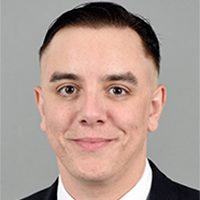 Carlos Santos: Currently an assistant professor in counseling psychology at ASU, Santos is coming to UCLA Luskin Social Welfare. His work is principally on gender and ethnic identities, stereotypes, and their impacts on social adjustment, educational performance and outcomes among adolescents in communities of color. He received his PhD from NYU and his work has been funded by NSF and NIH. In addition to his monograph “Studying Ethnic Identity” for the American Psychological Association, his work has been published in many outlets, including the Journal of Youth and Adolescence and the Journal of Counseling Psychology.
Carlos Santos: Currently an assistant professor in counseling psychology at ASU, Santos is coming to UCLA Luskin Social Welfare. His work is principally on gender and ethnic identities, stereotypes, and their impacts on social adjustment, educational performance and outcomes among adolescents in communities of color. He received his PhD from NYU and his work has been funded by NSF and NIH. In addition to his monograph “Studying Ethnic Identity” for the American Psychological Association, his work has been published in many outlets, including the Journal of Youth and Adolescence and the Journal of Counseling Psychology. V. Kelly Turner: Turner is currently an assistant professor of geography at Kent State and her focus is human-environmental interaction and urban management. She will join Luskin Urban Planning in the fall. Her focus has been on how institutional arrangements and good metrics for resource consumption can help us build toward a more sustainable ecosystem, and she has applied this work to water resources, sustainable urbanism, and green infrastructure. She is the author of more than a dozen journal articles in publications such as Applied Geography, Ecology and Society, Urban Geography, and others.
V. Kelly Turner: Turner is currently an assistant professor of geography at Kent State and her focus is human-environmental interaction and urban management. She will join Luskin Urban Planning in the fall. Her focus has been on how institutional arrangements and good metrics for resource consumption can help us build toward a more sustainable ecosystem, and she has applied this work to water resources, sustainable urbanism, and green infrastructure. She is the author of more than a dozen journal articles in publications such as Applied Geography, Ecology and Society, Urban Geography, and others.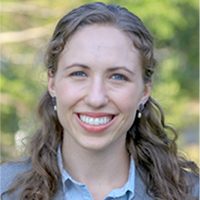 Emily Weisburst: She is finishing a PhD in economics at UT-Austin and will be joining Public Policy. Her work focuses on bias in policing, officer discretion in arrest behavior, police reform, and the effects of police presence in public schools. Weisburst previously served as a staff economist at the Council of Economic Advisors in the Executive Office of the President, and has done collaborative research for RAND and the State of Texas. Her work has been published in the Journal of Higher Education and Educational Evaluation and Policy Analysis.
Emily Weisburst: She is finishing a PhD in economics at UT-Austin and will be joining Public Policy. Her work focuses on bias in policing, officer discretion in arrest behavior, police reform, and the effects of police presence in public schools. Weisburst previously served as a staff economist at the Council of Economic Advisors in the Executive Office of the President, and has done collaborative research for RAND and the State of Texas. Her work has been published in the Journal of Higher Education and Educational Evaluation and Policy Analysis.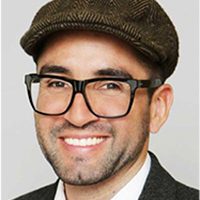 Chris Zepeda-Millan: He joins Luskin Public Policy. Zepeda-Millan is a political scientist and current professor of ethnic studies at UC Berkeley. His research focuses on social movements, immigration and communities of color, and has been published in American Journal of Political Science, Political Research Quarterly, Social Science Quarterly, and Politics, Groups and Identities. His book, “Latino Mass Mobilization: Immigration, Racialization and Activism,” was recently published by Cambridge University Press. Zepeda-Millan will be jointly appointed in the Department of Chicana/o Studies and will be working with the Latino Policy and Politics Initiative.
Chris Zepeda-Millan: He joins Luskin Public Policy. Zepeda-Millan is a political scientist and current professor of ethnic studies at UC Berkeley. His research focuses on social movements, immigration and communities of color, and has been published in American Journal of Political Science, Political Research Quarterly, Social Science Quarterly, and Politics, Groups and Identities. His book, “Latino Mass Mobilization: Immigration, Racialization and Activism,” was recently published by Cambridge University Press. Zepeda-Millan will be jointly appointed in the Department of Chicana/o Studies and will be working with the Latino Policy and Politics Initiative.